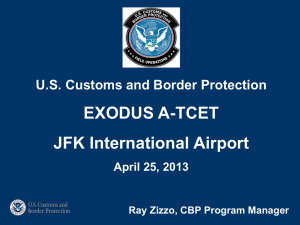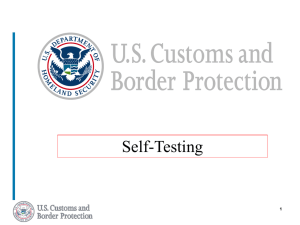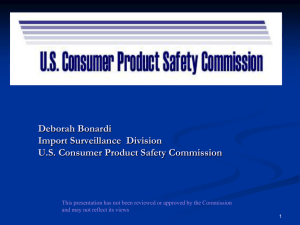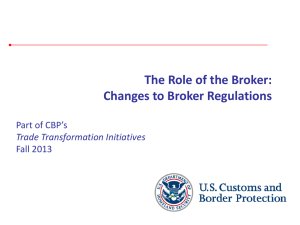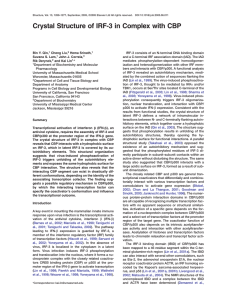Royer_ACA
advertisement
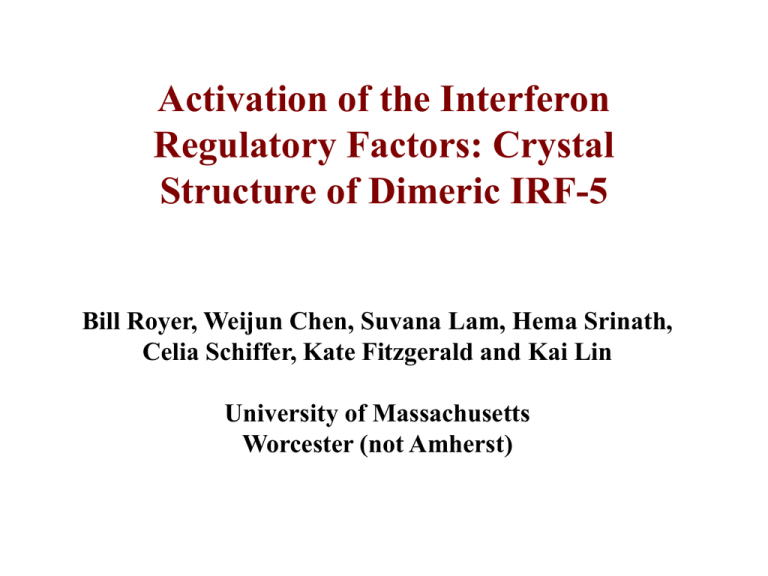
Activation of the Interferon Regulatory Factors: Crystal Structure of Dimeric IRF-5 Bill Royer, Weijun Chen, Suvana Lam, Hema Srinath, Celia Schiffer, Kate Fitzgerald and Kai Lin University of Massachusetts Worcester (not Amherst) Immediate and Delayed Anti-Viral Responses IFN-/ virus IFNAR Tyk2 Jak1 Stat2 IRF3 IRF3 IRF3 IRF3 IRF3 Stat1 IRF3 IRF-9 (ISGF3) P P IRF3 IRF3 P IRF3 IFN- gene P IRF3 IFN- genes IFN- other cytokines, anti-viral genes IFN- Innate immunity is triggered by the recognition of “pathogen-associated molecular patterns” such as viral nucleic acids by Toll-like receptors (TLR) or cytoplasmic receptors. Cytoplasm virus TLR7, TLR8 ssRNA dsDNA TLR9 Endosome MyD88 MyD88 IBs IKK Ub IRAK4 IRAK1 Ub TBK1 26S proteasome Ub TRAF6 TRAF6 ? 1 TABs IKK 2 IKK 3 IKK P P Ub IBs IRF5 IRF7 MAPKs NF-B IRF7 IRF5 IRF7 NF-B ATF2/c-Jun IRF5 P NF-B Nucleus IFNs IFN Inflammatory cytokines P IRFs are activated by phosphorylation in the C-terminal domain P C P P N Cytoplasm Nucleus P CBP P P P IRF-3 acts as a molecular sentry for viral infection in all cell types. Serine PO4 sites Domain structure of human IRF-3 380 RVGGASSLENTVDLHISNSHPLSLTS 110 1 200 DBD NLS 380 427 IAD AUD NES 427 173 IAD IRF-3 transactivation domain construct B.Y. Qin, et al. K. Lin (2003) Nat. Struct. Biol. 10, 913 -921 K. Takahashi, et al. F. Inagaki (2003) Nat. Struct. Biol. 10, 922-927 Structure of IRF-3 transactivation domain in complex with CBP supports the hypothesis that the autoinhibitory region masks CBP binding site CBP (2067-2112) N N C IRF-3 (residues 173-394) IRF-3 (residues 173-427) B.Y. Qin, et al. K. Lin (2005) Structure 13, 1269-1277 IRF-5 The autoinhibition of IRF-5 is less tight than that for the ubiquitously expressed IRF-3. IRF-5 is activated by: • viral expression • type I interferon • tumor suppressor p53 IRF-5 activates • type I interferon • inflammatory cytokines • tumor suppressors Human mutations of IRF-5 have been implicated in • systemic lupus erythematosis • multiple sclerosis • Sjogrens syndrome • Inflamatory bowel disease IRF-5 k.o. mice show • susceptibility to viral infection • susceptibility to tumors Domain structure of Human IRF-3 and IRF-5 405 380 RVGGASSLENTVDLHISNSHPLSLTS IRF-3 110 1 200 DBD NLS 380 427 IAD AUD NES 427 173 IRF-3 transactivation domain construct IAD 421 455 SGELSWSADSIRLQISNPDIKDRMV IRF-5 (variant 4) 1 140 233 DBD NLS IRF-5 transactivation domain construct 421 467 IAD NLS NES 222 467 IAD Interactions of CBP (2067-2112) with IRF-5 (222-467) and phosphomimetic mutants based on ITC data Complex CBP – IRF-5 CBP – IRF-5 (S427D) CBP – IRF-5 (S425D) CBP – IRF-5 (S436D) CBP – IRF-5 (S430D) Kd Change in affinity 1.64mM 0.96mM 0.71mM 0.67mM 0.56mM 1.0 fold 1.7 fold 2.3 fold 2.4 fold 2.9 fold Size exclusion chromatography to investigate oligomerization of IRF-5 (222-467) and IRF-5 S430D Monomer 450 µM IRF-5 600 800 mAU (280 nm) mAU(280 nm) Dimer IRF-5 + CBP 400 200 CBP IRF-5 WT 600 250 µM 400 100 µM 200 50 µM 0 0 12.0 13.0 14.0 15.0 16.0 17.0 18.0 13.0 19.0 14.0 Volume (ml) 15.0 Volume (ml) 16.0 17.0 450 µM mAU (280 nm) 400 CBP 200 0 12.0 13.0 14.0 15.0 16.0 17.0 18.0 19.0 Volume (ml) mAU (280 nm) IRF-5 S430D IRF-5 S430D + CBP IRF-5 S430D 600 800 600 250 µM 400 100 µM 200 50 µM 0 13.0 14.0 15.0 Volume (ml) 16.0 17.0 C N N Helix 1 C C N Helix 2 IRF-3 autoinhibited monomer IRF-5 dimeric subunit IRF-3 complex with CBP IRF-3 autoinhibited monomer IRF-5 dimeric subunit IRF-3 complex with CBP N C C N IRF-5 (222-467) S430D Dimer N C C N IRF-5 (222-467) S430D Dimer Helix 5 plays key alternate roles in IRF autoinhibition and dimerization. IRF-3 monomer IRF-5 dimer S425 S430’(D) S427’ L403 I431’ Key interface residues in the IRF-5 dimer Y303 L433’ L307 R328 S436’ I435’ V310 D312 S436’ R353 R328 D442’ F279 D442’ V445’ K449’ R353 Helix 5 Helix 5 IRF-5 Dimer IRF-3 Monomer S425 S430’(D) S427’ L403 I431’ Y303 V391 L433’ L307 R328 L393 I435’ V310 D312 S436’ R353 I395 F279 D442’ V445’ K449’ Helix 5 S396 S425 S430’(D) S427’ L403 I431’ Key interface residues in the IRF-5 dimer Y303 L433’ L307 R328 S436’ I435’ V310 D312 S436’ R353 R328 D442’ F279 D442’ V445’ K449’ R353 Helix 5 Helix 5 Mutation of interface residues disrupt dimer formation of IRF-5 in solution Monomer Dimer 600 IRF5-S430D & CBP IRF5-S430D/V310D & CBP IRF5-S430D/R328E & CBP IRF5-S436D/R328E & CBP IRF5-S430D/R353D & CBP IRF5-S430D/D442R & CBP mAU (280 nm) 500 400 300 200 CBP 100 0 13 14 15 16 17 Volume (ml) 18 19 20 Disruption of dimerization by mutation of interface residues inhibits IRF-5 activation IFN lucerferase (Fold Induction) HEK293 Cells S425 S430’(D) S427’ (homologous IRF3 residue number for absolutely conserved residues) (L362) L403 I431’ Y303 L433’ L307 (R285) R328 I435’ V310 D312 S436’ S436’ R353 R328 F279 K449’ D442’ D442’ V445’ R353 Helix 5 Helix 5 Mutation of IRF-3 residues homologous to IRF-5 dimeric interface residues disrupts formation of the IRF-3 dimer in solution Monomer Dimer mAU (280 nm) 400 IRF3-S386D/396D & CBP IRF3-S386D/S396D/R285E & CBP IRF3-S386D/S396D/L362D & CBP 300 CBP 200 100 0 12.0 13.0 14.0 15.0 16.0 17.0 Volume (ml) 18.0 19.0 20.0 IFN lucerferase (Fold Induction) Disruption of IRF-3 dimerization inhibits its activation HEK293 Cells Published IRF-3 mutants reinterpreted in light of our structure also support the crystallographically observed IRF5 dimer as representing the active state of IRF-3 Relationship of the IRF-5 transactivation domain dimer with IRF-3 DNA binding Domains D. Panne, T. Maniatis & S.C. Harrison (2007) Cell 129, 1111-1123 IRF activation, dimerization and CBP binding Phosphorylation C-term (Morphing CNS script from the Yale Morph Server, http://molmovdb.org) IRF activation, dimerization and CBP binding Phosphorylation (Morphing CNS script from the Yale Morph Server, http://molmovdb.org) P P P P P Cytoplasm Nucleus CBP P P P P University of Massachusetts, Worcester Dept. of Biochemistry and Molecular Pharmacology Kai Lin Weijun Chen Suvana Lam Hema Srinath Brendan Hilbert Celia Schiffer Department of Medicine Kate Fitzgerald Zhaozhao Jiang $ - NIH Sequence alignment of the C-terminal transactivation domains of human IRF family members The IFN Enhanceosome IRF3 IRF7 Binding of four N-terminal DNA Binding Domains of IRF-3 to promoter as part of IFN- enhanceosome D. Panne, T. Maniatis & S.C. Harrison (2007) Cell 129, 1111-1123

